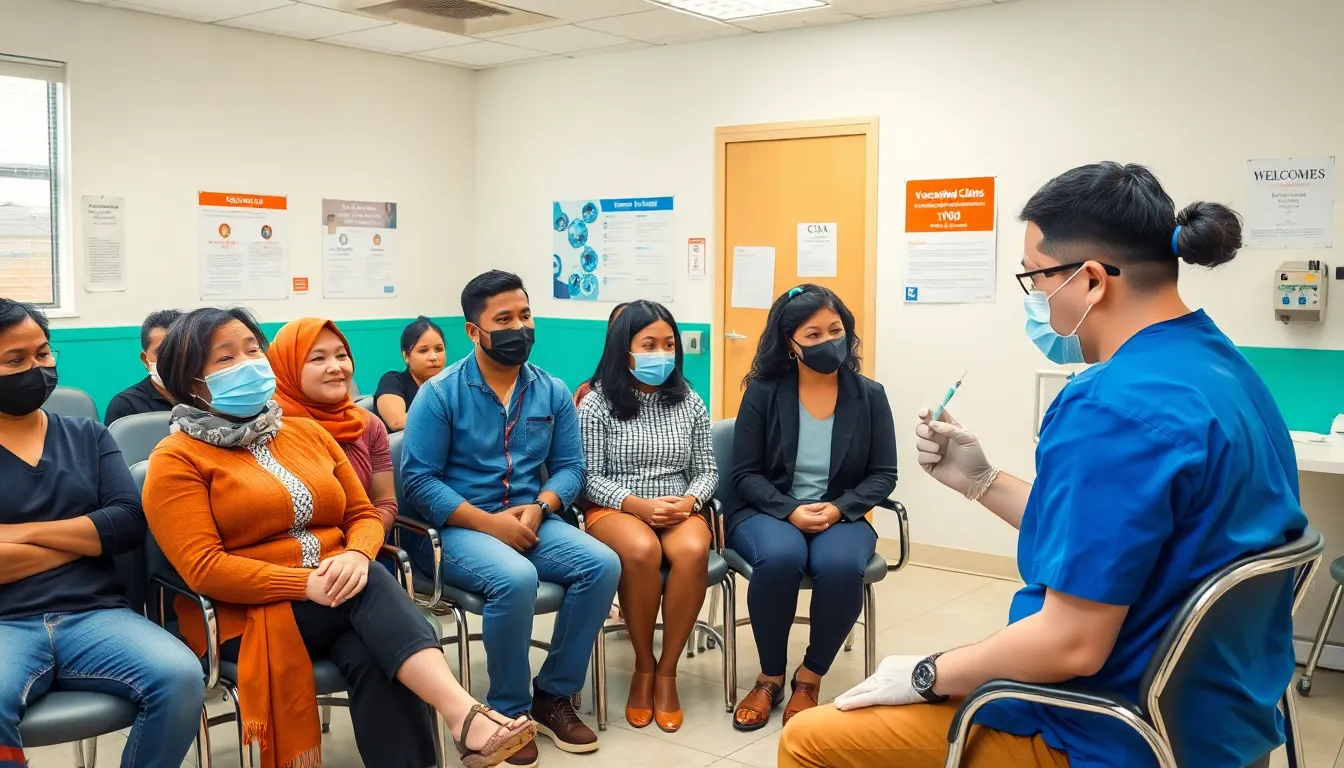Vaccines are like superheroes for our immune systems, swooping in to save the day from pesky diseases. But sometimes, even the mightiest heroes can have a few sidekicks that aren’t so friendly. An allergic reaction to a vaccine might sound like a plot twist in a superhero movie, but it’s a reality that deserves attention.
Table of Contents
ToggleOverview of Allergic Reactions to Vaccine
Allergic reactions to vaccines occur, though they remain rare. Cases involve an immune response that triggers symptoms, which can range from mild to severe. The Centers for Disease Control and Prevention (CDC) indicates that most reactions are mild, such as swelling or redness at the injection site.
In contrast, anaphylaxis represents a serious reaction, occurring within minutes to hours after vaccination. Symptoms of anaphylaxis may include difficulty breathing, swelling of the face and throat, rapid heartbeat, and dizziness. The CDC notes that the incidence of anaphylaxis after vaccination is approximately 2 to 5 cases per million doses administered.
Vaccine components, such as stabilizers, preservatives, or even proteins from the culture medium, can elicit these reactions. For instance, individuals allergic to eggs may experience reactions to certain influenza vaccines. Medical professionals recommend assessing a patient’s allergy history prior to vaccination.
Monitoring patients for at least 15 minutes post-vaccination helps identify any immediate allergic reactions. Those with a history of severe allergies might require a longer observation period. Additionally, treatment options exist, including the use of epinephrine for severe reactions.
Understanding the specifics of allergic reactions to vaccines contributes to informed decision-making about vaccinations. Safety protocols ensure that potential risks are minimized, allowing individuals to benefit from vaccine protection against diseases.
Types of Allergic Reactions
Allergic reactions to vaccines can occur immediately or be delayed, each presenting distinct characteristics and timelines.
Immediate vs. Delayed Reactions
Immediate reactions typically occur within minutes to hours after vaccination. Anaphylaxis, a severe form of immediate reaction, affects about 2 to 5 individuals per million doses, showcasing its rarity. Symptoms often include difficulty breathing, swelling of the face or throat, and rapid heartbeat. Delayed reactions can arise several hours or days later, featuring milder symptoms such as hives or rash. These delayed responses, while less severe, still require monitoring and management.
Common Symptoms of Allergic Reactions
Common symptoms of allergic reactions vary in intensity and presentation. Mild symptoms include localized swelling, redness, or pain at the injection site. Rash, itching, and hives might occur as well. Severe symptoms encompass difficulty breathing, swelling in the throat, and rapid heart rate, indicative of anaphylaxis. Each individual may experience symptoms differently, underscoring the importance of awareness and prompt medical attention if severe reactions arise.
Causes of Allergic Reactions to Vaccine
Allergic reactions to vaccines stem from various factors, primarily the ingredients contained within the formulations.
Ingredients in Vaccines
Vaccine components can trigger allergic responses in susceptible individuals. Gelatin, egg protein, and certain preservatives have been identified as potential allergens. The CDC highlights that some influenza vaccines contain egg-based ingredients, posing a risk for those with egg allergies. Additionally, stabilizers aimed at enhancing vaccine effectiveness may contribute to allergic reactions in rare cases. Individuals should consult healthcare providers and disclose any known allergies to ensure appropriate vaccine choices.
Pre-existing Allergies
Individuals with pre-existing allergies have an increased risk of experiencing allergic reactions post-vaccination. Allergy histories should be assessed thoroughly by healthcare professionals prior to vaccination. Specific histories, including reactions to food, medications, or other vaccines, help determine potential vaccine-related risks. Patients with severe allergies might require special precautions, such as longer observation periods after administration. Monitoring helps identify immediate reactions, ensuring timely intervention if necessary.
Risk Factors for Allergic Reactions
Allergic reactions to vaccines depend on multiple risk factors. Understanding these components helps reduce potential complications during vaccination.
Personal and Family Medical History
Personal and family medical histories play significant roles in vaccine reactions. Individuals with prior allergic reactions to vaccinations exhibit increased sensitivity to future doses. Family histories of allergies, including eczema or asthma, also indicate a higher likelihood of adverse responses. Medical professionals evaluate these histories during consultations, guiding vaccination decisions. Those with a comprehensive understanding of their allergies benefit from informed choices around vaccine options and precautionary measures.
Specific Allergies
Specific allergies contribute to the risk of vaccine-related reactions. Ingredients like gelatin, egg proteins, or preservatives may trigger symptoms in susceptible individuals. For example, some influenza vaccines may contain egg-based components, posing risks for those with egg allergies. Healthcare providers assess patients for known allergies, tailoring vaccination plans accordingly. If an individual demonstrates an allergy to any component, professionals may recommend alternative vaccines or additional monitoring. This approach ensures patient safety while maintaining the benefits of immunization.
Management and Treatment Options
In the event of an allergic reaction to a vaccine, prompt management is crucial for ensuring the safety and well-being of the individual.
Immediate Care for Allergic Reactions
Immediate care involves assessing symptoms and initiating treatment. For mild reactions, antihistamines can alleviate discomfort. Medical professionals often recommend monitoring individuals closely for signs of severe reactions, such as difficulty breathing or swelling. In cases of anaphylaxis, administering epinephrine intramuscularly is essential. The CDC emphasizes that individuals experiencing severe symptoms require emergency medical attention. Observing patients for at least 15 minutes post-vaccination allows healthcare providers to catch any immediate concerns early. For those with a history of severe allergies, a longer observation period might be necessary.
Long-term Considerations
Long-term considerations play a vital role in addressing allergic reactions to vaccines. Individuals with pre-existing allergies should maintain open communication with healthcare providers about their allergies. Regular follow-ups allow for adjustments in vaccination plans based on evolving allergy histories. Professionals may suggest alternative vaccines that lack the known allergens. Individuals might also benefit from specialist consultations for tailored vaccine advice. Such careful planning ensures that the protective benefits of vaccines are maximized while minimizing risks associated with allergies.
Conclusion
Allergic reactions to vaccines, while rare, highlight the importance of understanding individual health histories. By recognizing potential allergens and assessing risk factors, healthcare providers can create tailored vaccination plans that prioritize safety. Immediate monitoring after vaccination is essential for identifying any adverse reactions early.
In cases of severe allergic responses, prompt treatment can save lives. Open communication with healthcare professionals about allergies ensures ongoing safety and allows for adjustments in vaccination strategies as needed. Ultimately, the protective benefits of vaccines remain paramount, and with careful planning, the risks associated with allergic reactions can be effectively managed.





